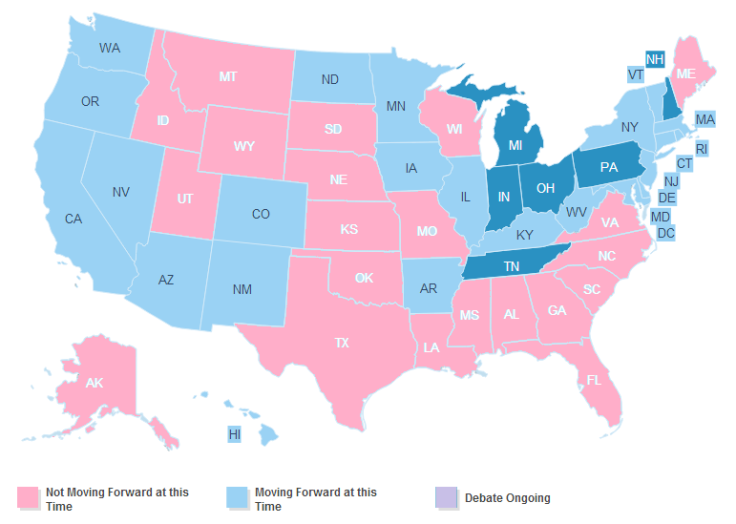With States Rejecting Medicaid Expansion, Obamacare's Promise Remains Unfulfilled

When the Supreme Court upheld key components of the Affordable Care Act in June 2012, the occasion appeared to be a victory for proponents of healthcare access for the millions of uninsured Americans standing to benefit from the law. But many state governments are blocking efforts to expand Medicaid, the public health insurance program for low-income families, in an effort to weaken the hotly debated health reform law.
As it was originally signed into law in March 2010, The Patient and Protection Affordable Care Act – often referred to as Obamacare – was intended to expand Medicaid eligibility nationwide. But the Supreme Court ruled in June 2012 that states could not be forced to participate in the Medicaid expansion, leaving it up to state governments to decide.
So far, 23 states and the District of Columbia have approved the expansion of Medicaid, 21 have failed to move forward for political reasons, and 6 are still debating.
Of the 15 million people who could have potentially become newly eligible for Medicaid, an estimated 9.7 million live in states that have disapproved or yet to approve of the expansion, according to an analysis conducted by the Associated Press using figures from the Urban Institute. That means that roughly 2 out of 3 people who could have qualified for Medicaid, won't.
Who Could Benefit From The Medicaid Expansion?
According to the Kaiser Family Foundation, 48 million nonelderly Americans were uninsured in 2011. The Affordable Care Act was designed to increase the numbers of insured to include 25-30 million of these people, about 15 million of whom would be reached through the Medicaid expansion.
The proposed expansion would have covered individuals and families who have incomes up to 180 percent of the federal poverty line, which for 2013 was $11,490 for an individual with no dependents.
Administered through states, Medicaid eligibility varies from state to state. Although Medicaid was designed to assist the neediest financially, only about 29 percent of working-age people who live below the federal poverty line are covered, according to the Urban Institute. Many states prioritize pregnant women, children, and individuals with dependents over others. The expansion would have increased access for many more of these vulnerable people, including individuals without dependents – an often overlooked population, who make up to 133 percent of the poverty level, or $15,281 for an individual.
Federal funding would flood states that approve of expanding Medicaid. New Medicaid enrollees would be covered 100 percent by federal funding from 2014-2016. Thereafter, the federal government would cover no less than 90 percent of the cost for these patients, with states picking up the remainder of the bill.
For example: Georgia, led by Republican Governor Nathan Deal, who is staunchly opposed to Obamacare, would have received $33 billion from the federal government over the course of a decade, at a cost of an estimated $2.5 billion to $4.5 billion to the state. But for some Republican governors, the cost is still too much for the benefit.
Medicaid expansion would have served many of the people who stood to benefit most from the Affordable Care Act. But the goal of insuring as many Americans as possible will remain unfulfilled.
What Are The Consequences Of Not Expanding?
While states may be refusing the additional cost of Medicaid expansion, the cost of not expanding Medicaid is being deferred to hospitals.
The Washington Post recently published an in-depth case analysis of how Grady Memorial Hospital in Atlanta is on the verge of a financial crisis. Without the additional Medicaid beneficiaries, an additional 27,000 uninsured patients visit seeking free treatment and an estimated $60 million less is going toward the hospital.
Moreover, many public hospitals serving low-income and uninsured populations are receiving less payments from the federal government than usual through the Disproportionate Share Hospital (DSH) program. DSH payments from the federal government to public hospitals were reduced, from $90 million to $45 million a year in Grady Memorial's case, in hopes that additional Medicaid payments would offset the losses. But without additional Medicaid beneficiaries, Grady is suffering from double losses.
In order to make up for the financial losses, Grady is considering closing entire clinical practices.
America Divided
The majority of low-income Americans who would newly qualify for Medicaid live in traditionally conservative states, such as Texas, Florida, and Georgia, which is why a disproportionately high amount of them will not see benefit from the expansion. With states either approving or disapproving Medicaid expansion roughly along blue state and red state lines, the enactment of the Affordable Care Act will look drastically different from one part of the country to another.
In conservative states, where healthcare may not be perceived as the responsibility of the government, many of the indigent will continue to be uninsured and lack basic services. Some of the elected leadership fear that the federal government would renege on its commitment to funding.
In liberal states, an increase in Medicaid enrollees will surely strain existing healthcare systems, but the additional payments would ideally allow services to adapt and grow.
The remaining 6 states that are still debating the expansion partially overlap with campaign swing states, including Ohio, led by Republican Governor John Kasich. Although known as a vociferous opponent of the health reform law in the past, he is encouraging the Ohio state legislature to approve the expansion by appealing to Christian morality of helping the poor.
"When you die and get to the meeting with St. Peter, he's probably not going to ask you much about what you did about keeping government small, but he's going to ask you what you did for the poor. You'd better have a good answer," Kasich said.



























